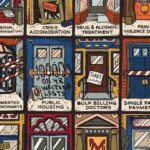Go Fiona! Patten Legislates for Drug Decriminalisation in Victoria

Reason Party leader Fiona Patten is yet again doing what she does best: pushing for progressive change in the state of Victoria.
Over recent years, the Victorian MLC has successfully seen the establishment of the Richmond supervised injecting room, the enactment of the first nation’s current assisted dying laws, and the sex work decriminalisation laws she initiated are now awaiting final guaranteed approval.
Patten last Friday announced that she’ll be introducing a bill into Victorian parliament this week, which will seek to decriminalise the use and personal possession of all illicit substances, mirroring such initiatives that already operate in Portugal and the US state of Oregon.
“It is about saving lives. It is about treating drug use as a health issue with a health solution, not a criminal one,” Patten explained in a piece in the Age over the weekend. “Prohibition is being replaced with successful harm-minimisation approaches the world over.”
The Reason Party MLC further likened the war on drugs to the redundancy of alcohol prohibition in the US a century ago. And she points out that rather than increase drug use, decriminalisation sees it fall, along with crime, incarceration rates, and drug-related deaths and illnesses.
A global trend
Patten also initiated the Victorian Inquiry Into Drug Law Reform, which delivered its final report in 2018. It considered decriminalisation, or the removal of criminal penalties that apply to personal possession and use of all illicit drugs, with a particular focus on the Portuguese model.
At the turn of the century, Portugal had a massive drug problem, with 1 percent of the population dependent upon heroin. So, in response, the Portuguese government decriminalised all illegal drugs in 2001, and further enhanced the availability and quality of rehabilitation services.
So, today, those found in possession of a quantity of illegal drugs deemed personal are no longer charged, but rather they’re sent to a dissuasion panel, where a doctor, a lawyer and a social worker consider whether they need treatment or a minor fine. And most are found to warrant neither.
Two decades into the reform and drug use has not spiked. However, drug harms have dramatically decreased, including deaths and HIV infections, which are now some of the lowest in Europe.
Oregon adopted this model in February last year, while the US states of Maine, Massachusetts, Rhode Island and Vermont are now contemplating similar such laws.
And unknown to many Australians, the ACT is currently deliberating upon its own drug decriminalisation bill.
Drafted by Labor MLA Michael Pettersson, the bill is likely to be succeed, with his last ground-breaking piece of legislation seeing Canberra legalise cannabis use and personal possession in early 2020.
A health issue, not a crime
Patten further pointed out last Friday that 95 percent of all drug arrests in her state relate to private consumers, not traffickers or manufactures. While over 26,000 drug-related arrests in Victoria last year were for drug use or personal possession, which equates to 72 Victorians a day.
“Change here in Victoria and throughout Australia is inevitable,” Patten makes clear. “You can help make that sooner rather than later by joining the campaign and urging your elected representative to honour their responsibility to protect and promote the public interest at decrim.com.au.







